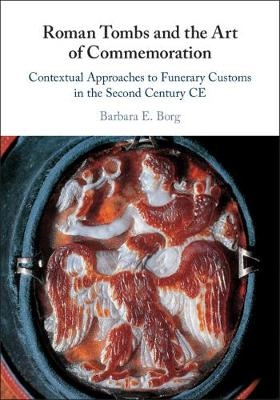
Roman Tombs and the Art of Commemoration
Contextual Approaches to Funerary Customs in the Second Century CE
Seiten
2022
Cambridge University Press (Verlag)
978-1-108-46035-4 (ISBN)
Cambridge University Press (Verlag)
978-1-108-46035-4 (ISBN)
Employs the full range of material and written evidence to explore four key questions around Roman funerary customs that alter our view of the society and its values: senators' tombs, the change from incineration to inhumation, tombs showcasing family longevity, and the deceased's association with the divine and apotheosis.
The history of funerary customs in Rome contains many unanswered questions and controversial debates, especially concerning the significant developments of the second century CE. In this book, distinguished historian Barbara E. Borg employs the full range of material and written evidence to explore four key questions that change our view of Roman society and its values. For the first time, senatorial burial practices can be reconstructed and contrasted with those of other classes. Borg then explains the change from incineration to inhumation as a revival of old Roman mores that accelerated after the example set by Hadrian. In the third chapter, she argues that tombs became prime locations for promoting and displaying long family lines among the elite, which then inspired freedmen to undertake similar commemorative practices. Finally she explores the association of deceased persons with the divine and apotheosis through portraits on divine body shapes and temple tombs.
The history of funerary customs in Rome contains many unanswered questions and controversial debates, especially concerning the significant developments of the second century CE. In this book, distinguished historian Barbara E. Borg employs the full range of material and written evidence to explore four key questions that change our view of Roman society and its values. For the first time, senatorial burial practices can be reconstructed and contrasted with those of other classes. Borg then explains the change from incineration to inhumation as a revival of old Roman mores that accelerated after the example set by Hadrian. In the third chapter, she argues that tombs became prime locations for promoting and displaying long family lines among the elite, which then inspired freedmen to undertake similar commemorative practices. Finally she explores the association of deceased persons with the divine and apotheosis through portraits on divine body shapes and temple tombs.
Barbara E. Borg is Professor of Classical Archaeology at the University of Exeter. She has published widely on Greek and Roman art, archaeology and history, and her monographs include Crisis and Ambition: Tombs and Burial Customs in Third-Century CE Rome (2013). She is editor of Paideia: The World of the Second Sophistic (2004) and A Companion to Roman Art (2015).
1. In search of deceased senators; 2. Reviving tradition in Hadrianic Rome: from incineration to inhumation; 3. Family matters: the long life of Roman tombs; 4. Straddling borderlines: divine connotations in funerary commemoration.
| Erscheinungsdatum | 11.05.2022 |
|---|---|
| Zusatzinfo | Worked examples or Exercises; 95 Halftones, black and white; 5 Line drawings, black and white |
| Verlagsort | Cambridge |
| Sprache | englisch |
| Maße | 168 x 243 mm |
| Gewicht | 643 g |
| Themenwelt | Kunst / Musik / Theater ► Kunstgeschichte / Kunststile |
| Geisteswissenschaften ► Archäologie | |
| Geschichte ► Allgemeine Geschichte ► Vor- und Frühgeschichte | |
| Geschichte ► Allgemeine Geschichte ► Altertum / Antike | |
| ISBN-10 | 1-108-46035-6 / 1108460356 |
| ISBN-13 | 978-1-108-46035-4 / 9781108460354 |
| Zustand | Neuware |
| Informationen gemäß Produktsicherheitsverordnung (GPSR) | |
| Haben Sie eine Frage zum Produkt? |
Mehr entdecken
aus dem Bereich
aus dem Bereich
Was Pompeji über uns erzählt
Buch | Hardcover (2023)
Propyläen (Verlag)
32,00 €
auf den Spuren der frühen Zivilisationen
Buch | Hardcover (2023)
C.H.Beck (Verlag)
20,00 €


